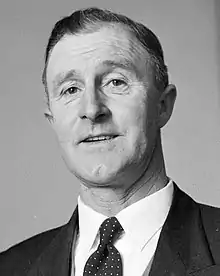Gordon Grieve
Gordon Glendinning Grieve QSO (21 August 1912 – 17 October 1993) was a New Zealand politician of the National Party.

Grieve in 1959
Biography
| New Zealand Parliament | ||||
| Years | Term | Electorate | Party | |
| 1957–1960 | 32nd | Awarua | National | |
| 1960–1963 | 33rd | Awarua | National | |
| 1963–1966 | 34th | Awarua | National | |
| 1966–1969 | 35th | Awarua | National | |
Grieve was born in 1912 in Otahuti, Southland, a locality north-west of Invercargill. He attended Otahuti School and became a farmer. He was active with the Southland A & P Association.[1]
He represented the Awarua electorate from 1957 to 1969, when he retired.[2] A Presbyterian, in 1961 he was one of ten National MPs to vote with the Opposition and remove capital punishment for murder from the Crimes Bill that the Second National Government had introduced.
In the 1980 Queen's Birthday Honours, Grieve was appointed a Companion of the Queen's Service Order for public services.[3]
Notes
- Gustafson 1986, p. 316.
- Wilson 1985, p. 201.
- "No. 48214". The London Gazette (3rd supplement). 14 June 1980. p. 40.
References
- Gustafson, Barry (1986). The First 50 Years : A History of the New Zealand National Party. Auckland: Reed Methuen. ISBN 0-474-00177-6.
- Wilson, James Oakley (1985) [First ed. published 1913]. New Zealand parliamentary record, 1840–1984 (4 ed.). Wellington: V.R. Ward, Govt. Printer. OCLC 154283103.
| New Zealand Parliament | ||
|---|---|---|
| Preceded by George Richard Herron |
Member of Parliament for Awarua 1957–1969 |
Succeeded by Hugh Templeton |
This article is issued from Wikipedia. The text is licensed under Creative Commons - Attribution - Sharealike. Additional terms may apply for the media files.